How Much Boiled Chicken to Feed Cat? (Kitty, Senior & Adult Cats)
My sister’s cat, Snickers, was always a finicky eater. She would only eat boiled chicken, and she was very particular about how much she ate. So my sister started measuring out exactly how much boiled chicken to feed her cat each day. It was a tedious process, but it kept Snickers healthy and happy.
One day, my sister was out of town and I had to take care of Snickers. I followed her instructions to the letter, but when it came time to feed Snickers, she just wouldn’t eat. I tried everything, but she just wasn’t interested. I called my sister in a panic, and she told me to just give her a little bit more chicken than usual. I did as she said, and Snickers finally ate.
Since then, I’ve learned that cats are creatures of habit, but they also have their own personalities. What works for one cat might not work for another. So here I’ll share what I’ve learned about how much boiled chicken to feed a cat and what things to consider when making that decision.
How Much Boiled Chicken to Feed a Cat?
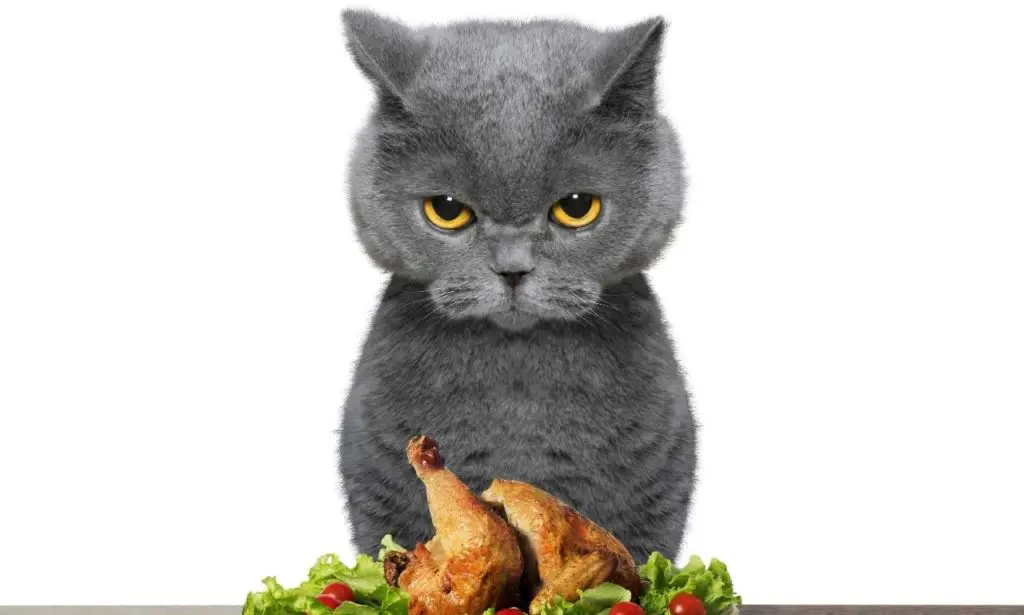
When it comes to feeding your cat, there are a lot of different options out there. However, one of the simplest and most nutritious options is boiled chicken. But how much boiled chicken should you feed your cat?
Here I’ll focus on cats, both adult and senior, since their nutritional requirements are different.
Kittens (up to 6 months old)
Kittens need a lot of energy to grow and develop, so they require a higher protein diet than adult cats. You can feed them boiled chicken as part of a homemade diet or as an occasional treat. If you’re feeding them boiled chicken as a treat, give them about 1/2 ounce per day.
Adult Cats (6 months to 7 years old)
Adult cats need a less protein than kittens, so you can feed them boiled chicken as an occasional treat or as part of a homemade diet. If you’re feeding them boiled chicken as a treat, give them about 1/4 ounce per day.
Senior Cats (7 years and up)
Senior cats tend to have a lower energy level and may need a diet that’s lower in protein. You can feed them boiled chicken as an occasional treat or as part of a homemade diet. If you’re feeding them boiled chicken as a treat, give them about 1/8 ounce per day.
How Often Can Cats Eat Boiled Chicken?
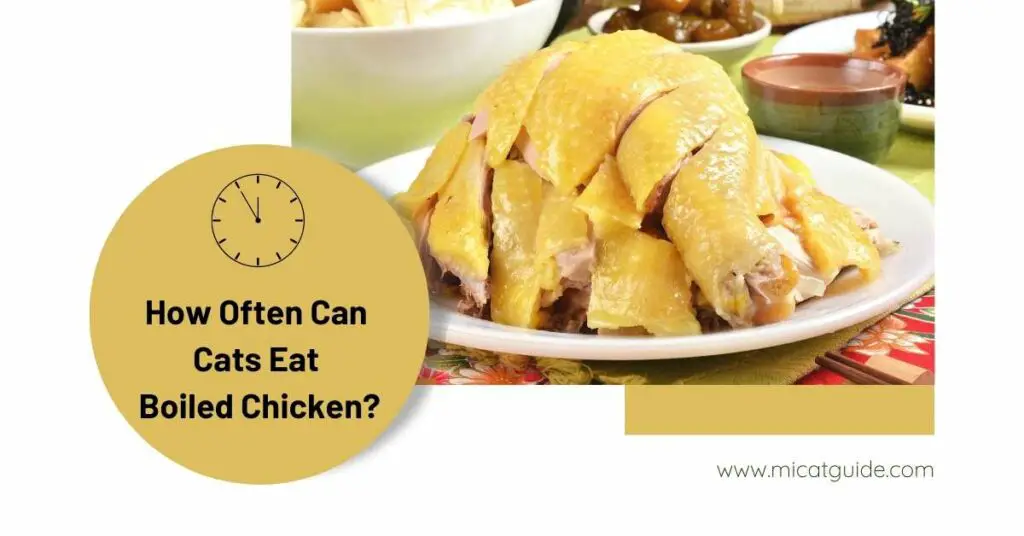
You can feed your cat boiled chicken as often as you like. However, if you’re feeding them chicken as part of a homemade diet, it’s important to make sure that they’re getting all the nutrients they need.
This means feeding them a variety of foods, including fruits, vegetables, and grains. If you’re feeding your cat boiled chicken as a treat, you can give it to them every day.
Just be sure to reduce their regular food intake so that they don’t become overweight.
10 Health Benefits of Boiled Chicken for Cats

When it comes to feeding their cats, many pet parents focus on providing a nutritionally complete and balanced diet from a can or bag.
However, some people like to cook for their cats and choose to feed them boiled chicken as a occasional treat or as part of a homemade diet.Here I’ll share what I’ve learned about the benefits of boiled chicken for cats:
1. Packed with Protein and Essential Nutrients
Yes, all that protein in chicken is great for your kitty’s muscles, but it also contains other essential nutrients like niacin, selenium, and vitamins B6 and B12.
I found a study that looked at the nutrient levels of raw, cooked, and canned chicken. The cooked chicken had the highest levels of niacin, selenium, and vitamins B6 and B12.
2. Good for Digestion
One of the benefits of boiled chicken for cats is that it’s easier to digest than other forms of protein like beef or pork. If your kitty is having digestive issues, boiled chicken may be a good food to try.
3. Low in Fat
Another benefit of boiled chicken for cats is that it’s lower in fat than other forms of protein like beef or pork. This can be helpful if your kitty is overweight or has a health condition like pancreatitis that requires a low-fat diet.
4. Allergy-Friendly
If your kitty has allergies, chicken may be a good protein source to try. It’s also hypoallergenic, so it’s unlikely to cause an allergic reaction. Just make sure you do not offer anything like rotisserie chicken as this one unhealthy for your cats.
5. Boosts Immune System
The nutrients in chicken can help boost your kitty’s immune system. This is especially important if your kitty is sick or recovering from surgery.
6. Promotes Healthy Skin and Coat
The protein in chicken helps to promote a healthy skin and coat. This is because protein is essential for the production of keratin, which is the main structural component of skin and hair.
7. Good for Joints
The nutrients in chicken can also help to promote healthy joints. This is especially important for senior cats or those with joint problems like arthritis.
8. Natural Deodorizer
Believe it or not, the amino acids in chicken can help to neutralize body odor. So if your kitty has stinky breath or body odor, chicken may be able to help.
9. Prevents UTI’s
The amino acids in chicken can also help to prevent urinary tract infections. This is because they help to increase the acidity of urine, which makes it less hospitable for bacteria.
10. Makes a Delicious Treat
Last but not least, boiled chicken is simply delicious! Many cats love the taste of chicken, so it makes a great treat.
A study published in the Journal of Animal Physiology and Animal Nutrition found that boiled chicken was one of the most palatable foods for cats.
Things to Consider When Making The Decision
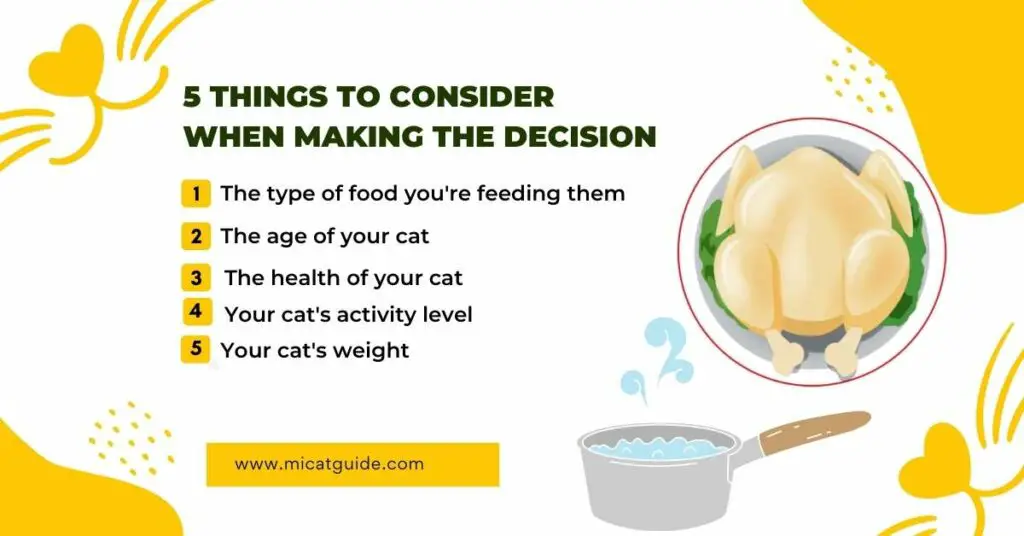
When it comes to deciding how much boiled chicken to feed a cat, there are a few things to consider. Here I’ll try to highlight all the things that I think are important.
1. The type of food you’re feeding them.
If you’re feeding your cat a homemade diet, it’s important to make sure that they’re getting all the nutrients they need.
This means feeding them a variety of foods, including fruits, vegetables, and grains. If you’re only feeding them boiled chicken, they may not be getting all the nutrients they need.
2. The age of your cat.
Kittens need a lot of energy to grow and develop, so they require a higher protein diet than adult cats.
If you’re feeding them boiled chicken as part of a homemade diet, make sure to give them enough other foods to meet their nutritional needs.
3. The health of your cat.
If your cat has any health problems, such as kidney disease, you’ll need to be extra careful about their diet. This is because some health problems can be made worse by too much protein.
So if you’re unsure about how much boiled chicken to feed a cat with health problems, it’s best to talk to your veterinarian.
4. Your cat’s activity level.
If your cat is very active, they may need more food than a less active cat.
This is because they’re using up more energy. So if you’re unsure about how much boiled chicken to feed your cat, it’s best to talk to your veterinarian.
5. Your cat’s weight.
If your cat is overweight, they may need to eat less than a cat of normal weight. This is because they don’t need as much food to maintain their weight.
So if you’re unsure about how much boiled chicken to feed your cat, it’s best to talk to your veterinarian.
5 Steps to Make Boiled Chicken for Cats
Now that you know all about feeding boiled chicken to cats, let’s get started on making it! Here’s what you’ll need:
- 1 pound of boneless, skinless chicken breasts
- 2 cups of water
- A pot
- A strainer
- A knife and cutting board
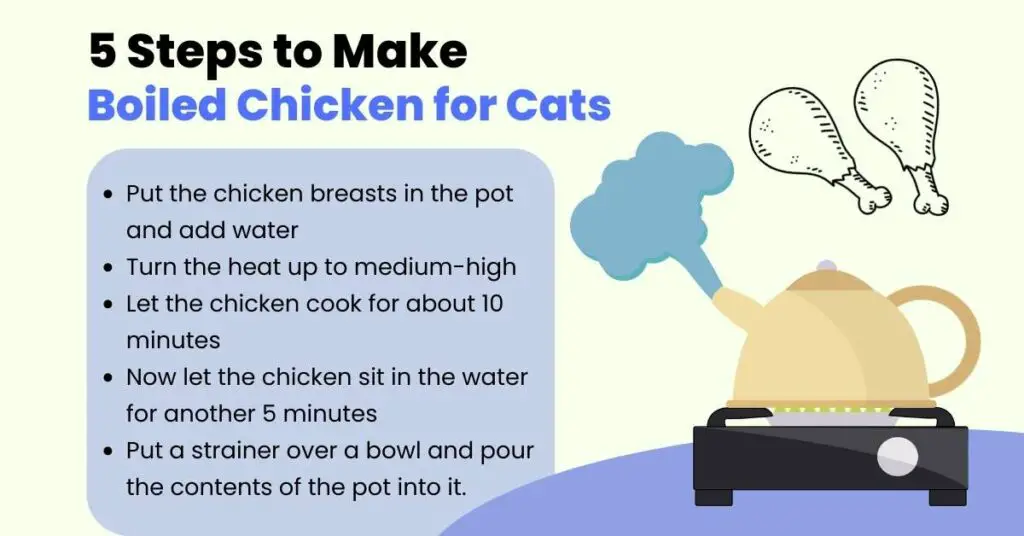
Here’s how to do it:
Now here are all the 5 easy steps for you to follow:
- Put the chicken breasts in the pot and add water so that it covers them.
- Turn the heat up to medium-high and wait for the water to come to a boil.
- Once the water is boiling, turn the heat down to low and let the chicken cook for about 10 minutes.
- After 10 minutes, turn off the heat and let the chicken sit in the water for another 5 minutes.
- Now it’s time to strain the chicken. Put a strainer over a bowl and pour the contents of the pot into it.
And that’s it! You’ve now boiled chicken for cats. Just be sure to let it cool down before you feed it to them.
5 Tips for Feeding Boiled Chicken to Cats
Now that you know how to make boiled chicken for cats, here are a few tips to make sure they enjoy it:
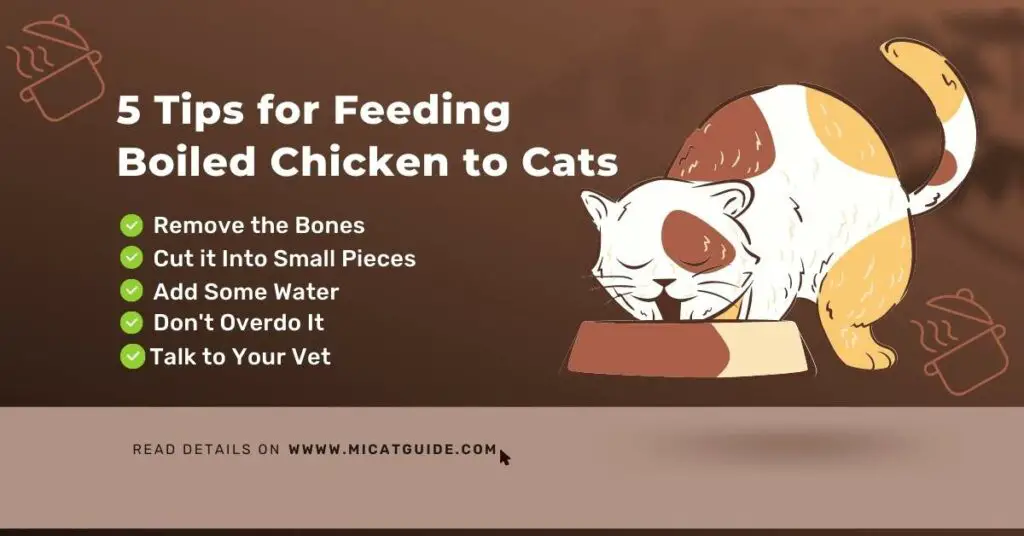
1. Remove the Bones
I know I said that you can give your cat boneless, skinless chicken breasts, but it’s actually better to remove the bones. This is because they can be a choking hazard. So before you give your cat the chicken, be sure to remove any bones.
2. Cut it Into Small Pieces
Cats are small creatures, so they can’t handle large pieces of food. This is why it’s important to cut the chicken into small pieces before you give it to them.
If you’re not sure how to do this, just take a look at your cat’s mouth. They have tiny mouths, so you’ll want to cut the chicken into pieces that are about that size.
3. Add Some Water
Cats need to stay hydrated, so it’s important to add some water to their diet. You can do this by adding a little bit of water to the chicken before you give it to them. Just be sure not to add too much, or they may not be able to eat it all.
4. Don’t Overdo It
Like I said before, chicken is a good source of protein. But too much protein can be bad for cats. So don’t overdo it when you’re feeding them boiled chicken. A good rule of thumb is to give them no more than 1/2 cup per day.
5. Talk to Your Vet
If you’re ever unsure about anything, it’s always best to talk to your veterinarian. They can help you figure out how much chicken to feed your cat, as well as what other foods they need to stay healthy.
My Final Thoughts
In conclusion, boiled chicken is a great option for cats and this is something that you can offer your cats in everyday meals. This can be a good source of protein for your cats and it can also offer them other health benefits.
Just remember to remove the bones and cut the chicken into small pieces before you give it to them. And always talk to your veterinarian if you’re ever unsure about anything. Thanks for reading!



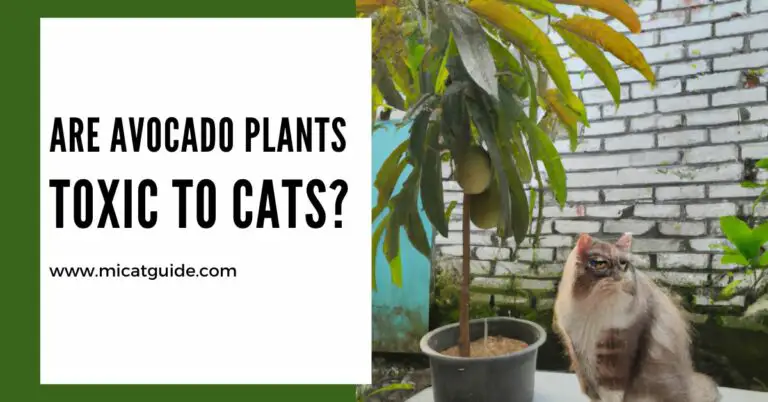
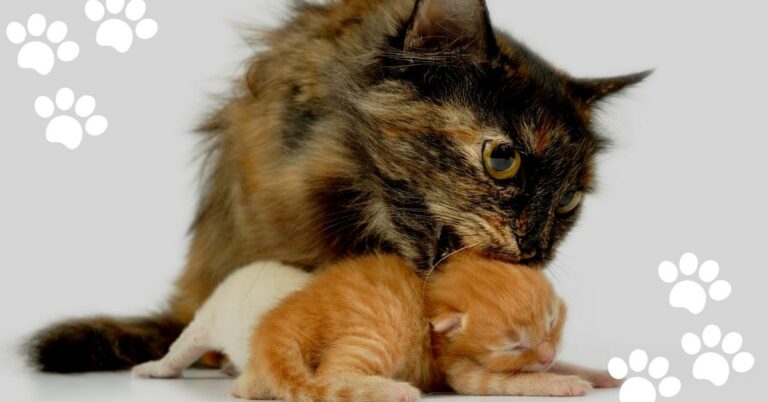
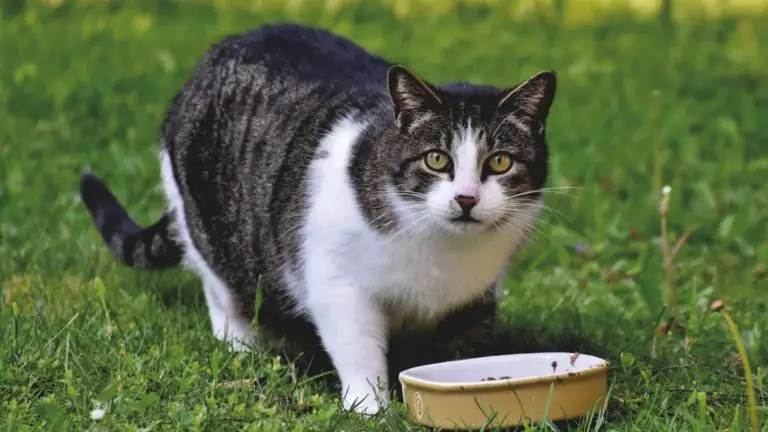

Thanks for the ideas and recipes. I have been attempting formulating a recipe for Maine Coons. I just thought I’d mention for your readers that unseasoned meat should always be used. Also, when adding water for the “soupy” recipes, use the water you cooked the meat in.
Finally, I have been buying some organic chicken recently. It has to be more nutritious. Now days, ground chicken can be found pretty easily. Otherwise, ask the butcher to grind your boneless meat. There are still a few butchers around that use meat grinders. Try using an ice tray to portion control your cat food recipe. It works great here.
Also, this might be one of the greatest tips: yesterday I found some reduced salmon in the meat counter. I put it in a freezer bag to use later. Something that can be researched more is grinding uncooked bones in a VITAMIX. Uncooked bones are supposedly soft and don’t offer the hazard of cooked (chicken) bones.
Thank you again for your valuable information on healthy meals for our feline friends.
Hi, Michelle’s Maine 🐱
I am very impressed by the thoughtful advice given here for preparing healthy meals for Maine Coons. It is great to learn about the use of unseasoned meat, organic chicken, and other options like ground salmon.
The tip about portion control using an ice tray is also a great idea. I am excited to research more about grinding uncooked bones in a Vitamix. Thank you for providing these helpful recipes and ideas.